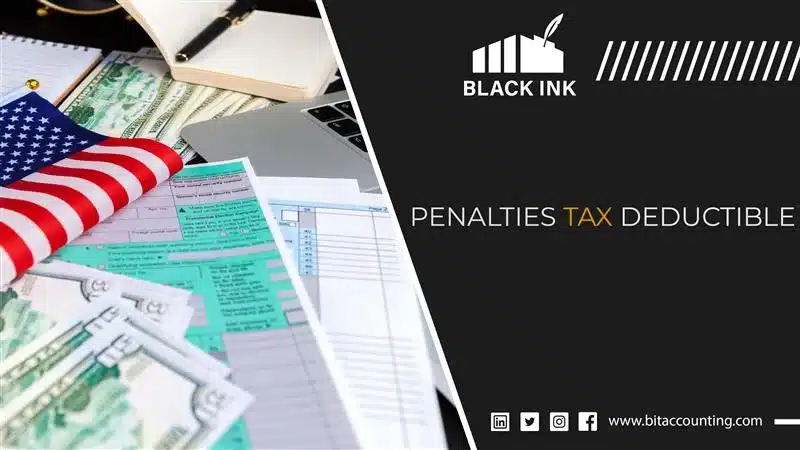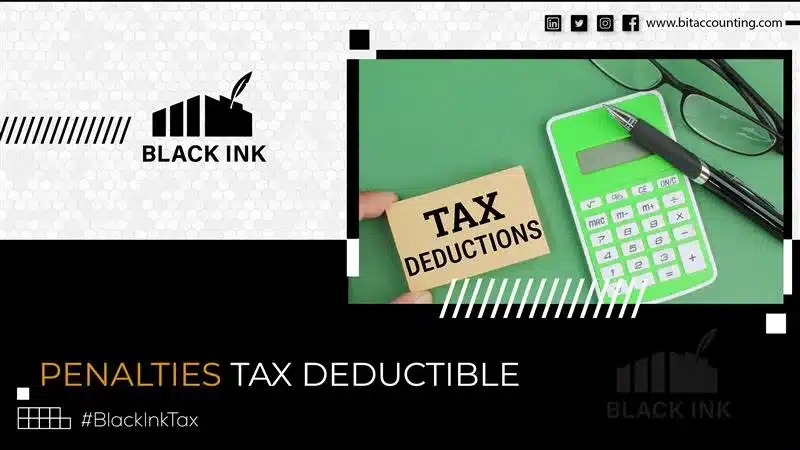
Table of Contents
Are Penalties Tax Deductible? What You Need to Know
When it comes to taxes, many people are surprised to find out what they can and can’t claim on their tax return. While some costs like office supplies or travel expenses are easy to deduct, others can be confusing. One common question is: Are penalties tax deductible? The answer isn’t always clear, and making the wrong guess can lead to trouble with the Internal Revenue Service (IRS). This article breaks down what you need to know about penalty deductions and how United States law treats them.
Let’s explore why this is such a tricky area in taxation, how different types of penalties are handled, and what you as a taxpayer need to keep in mind when dealing with fines, fees, or legal charges.
Understanding Tax-Deductible Expenses
To understand penalty deductions, it’s helpful to first know what counts as a tax-deductible expense. For something to be deductible, it usually must be:
- Ordinary (common in your trade or business),
- Necessary (helpful and appropriate), and
- Directly related to making income or running a business.
Examples of deductible expenses include:
- Office supplies
- Business travel
- Employee wages
- Rent for business space
On the other hand, things like bribes, personal expenses, and fines paid to the government are often non-deductible. The IRS Publication 535 gives clear rules about what business expenses you can and cannot deduct. This guide is useful for understanding how your payments impact your final tax bill.
Types of Penalties and Their Tax Treatment
Not all penalties are created equal. Whether you can deduct them depends on who gave the penalty, what it was for, and how it ties to your business or income.
Business-Related Penalties
Some penalties that come from business operations might be deductible:
- Late payment penalties from vendors or lenders: These might be deductible if they are part of your regular business dealings.
- Professional fines, like those from licensing boards or industry regulators, can sometimes be deducted—as long as they aren’t related to illegal actions.
- Penalties for breaking a contract could be deductible if the contract was part of your usual business risks.
Government and Legal Penalties
These penalties are usually not deductible:
- IRS penalties for filing your tax return late or paying late are never deductible.
- Parking fines and traffic tickets are considered personal and can’t be deducted.
- Environmental violations or OSHA fines are often punitive and not deductible.
- Some civil penalties, like fines from the Securities and Exchange Commission (SEC), may be deducted if they are meant to compensate for damage, not to punish.
Employment-Related Penalties
- Fines for late payroll tax deposits are not deductible.
- Penalties for violating labor laws are also non-deductible in most cases.
IRS Rules on Penalty Deductions
The law is pretty clear about this. According to IRC Section 162(f), you can’t deduct any fine or penalty paid to the government for breaking a law. This rule helps keep people from using illegal activities to lower their taxes.
However, there are exceptions. If the payment is meant to compensate for a loss or damage (not punish), it might still be deductible. For example:
- Environmental cleanup costs might be deductible if they are meant to repair harm, not punish the business.
- Some court cases show where courts allowed deductions if the payment was compensatory.
It’s important to have clear documents like legal papers, agreements, or court decisions showing the true purpose of the payment.

How to Determine If a Penalty Is Deductible
Figuring out whether you can deduct a penalty takes a few steps:
Step #1: Who Gave the Penalty?
If the government issued the fine, chances are it’s not deductible. If it came from a private group or business, it might be.
Step #2: What Was the Purpose?
Is the penalty a punishment (punitive) or repayment for damage (compensatory)? Only compensatory ones might be deductible.
Step #3: Check IRS Publications or Ask a Pro
Resources like IRS tax forms, IRS Publication 535, or even talking to a tax professional can help you get it right.
Step #4: Keep Records
Always save your documents—receipts, contracts, settlement letters—just in case of an income tax audit.
Common Misconceptions About Penalty Deductions
There are many myths about deducting penalties. Let’s clear some of them up:
- Myth: All business penalties are deductible.
Truth: Only some are. Many fines, especially from the government, are not. - Myth: If it’s called a “fee,” it’s okay to deduct.
Truth: The name doesn’t matter. The IRS looks at what it really is. - Myth: Lawsuit penalties can be deducted.
Truth: Only if they’re compensatory—not if they’re meant to punish.
What Happens If You Wrongfully Deduct a Penalty?
Taking a deduction you’re not allowed to can backfire. You might face:
- An IRS audit
- Paying back the taxes you owe
- Interest and penalties on unpaid taxes
If you make a mistake, it’s smart to amend your tax return right away.
Alternatives If a Penalty Isn’t Deductible
Even if you can’t deduct a penalty, you still have some options:
- Ask for a reduction: Agencies like the IRS offer penalty abatement in some cases.
- Structure the payment as restitution: If possible, make sure it’s labeled as compensatory.
- Deduct related legal fees: Sometimes the money spent on lawyers can be deducted.
Conclusion
So, are penalties tax deductible? Sometimes—but only in special cases. Most fines, especially those given by the federal government of the United States, can’t be claimed on your tax return. The key is knowing the rules, keeping good records, and asking for help when you need it. If you’re ever unsure, it’s best to speak with experts like BIT Accounting, who understand public law, business ownership, and the fine points of tax administration.
FAQs
1: Can I deduct IRS penalties on my tax return?
No. The IRS doesn’t let you deduct penalties for breaking tax rules.
2: What if a penalty is called a “fee”?
The IRS looks at what it’s for—not what it’s called.
3: Are business-related fines always deductible?
No. Only those that are not related to illegal acts and are part of normal business risks.
4: Should I consult someone about penalty deductions?
Yes. A tax expert can help make sure you follow the right governance and avoid issues with the tax organizations.
5: What if I already deducted a penalty by mistake?
File an amended return and fix the error before the IRS finds it during an income tax audit.
GET FREE QUOTE FOR ALL OF OUR SERVICES
Black Ink will send you a free analysis of your current state and what would be the cost of managing either a separate accounting and bookkeeping services or a complete solution across New York, USA. Do get in touch and we will be happy to consult you with our bookkeeping services in NY, New York, USA.
